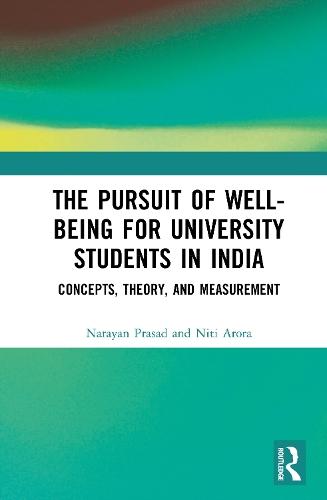Overview
This book details the concept, theory, and measurement of “human wellbeing,” in general, with a focus on university students in India. It investigates the experiences and correlates of wellbeing of Indian undergraduate students with the aim of enabling policymakers to plan and implement policies in the pursuit of a better quality of university life for students. The book analyses the status and experience of wellbeing of university students in a holistic manner by studying the various dimensions of their wellbeing. It identifies the areas of deficiency and addresses the issues of unrest faced by them. The framework encompasses six dimensions of student wellbeing, namely educational wellbeing, perceived economic wellbeing, health wellbeing, social wellbeing, wellbeing in the personal domain and factors contributing to psychological distress (a negative indicator). It examines the differences in the status of wellbeing with respect to their gender, place of origin and the social groups they belong to. It proposes recommendations to strengthen their wellbeing and presents a roadmap suggesting further scope of research in this area. This volume will be of interest to students, teachers and researchers of psychology, social psychology, sociology, mental health and wellbeing and economic psychology. It will also be useful to policymakers, counsellors, psychologists, academicians and those interested in wellbeing in general.
Full Product Details
Author: Narayan Prasad ,
Niti Arora
Publisher: Taylor & Francis Ltd
Imprint: Routledge
Weight: 0.453kg
ISBN: 9781032348360
ISBN 10: 1032348364
Pages: 174
Publication Date: 28 November 2025
Audience:
College/higher education
,
Tertiary & Higher Education
Format: Hardback
Publisher's Status: Forthcoming
Availability: Not yet available

This item is yet to be released. You can pre-order this item and we will dispatch it to you upon its release.
Author Information
Narayan Prasad has been Professor of Economics in the School of Social Sciences. Indira Gandhi National Open University, New Delhi, since 2006. He has also worked as the Director of the Research Unit and the Director of the Academic Coordination Division of the same. He has designed and developed research methodology courses for MPhil and PhD students (21 students have been awarded PhD degrees under his supervision), has published six books and has presented and published research papers in several international and national forums. He has delivered lectures in New York, Washington and Los Angeles, amongst others, and has also been invited to deliver lectures on various aspects of research methodology, including on Knowledge Generation in West and Bharat: Philosophical Perspectives, by various universities in India. His areas of research interest are: Human Wellbeing, Human Development, Spiritual Economics and the philosophical foundation of Economics. Niti Arora is an Associate Professor of Economics at Mata Sundri College for Women, University of Delhi. She holds an MPhil and PhD in Economics from Indira Gandhi National Open University (IGNOU) and is an alumna of Delhi School of Economics, University of Delhi. She has presented and published research papers in numerous national and international conference proceedings and has been actively involved in research projects. She regularly contributes to academic discourse as a coordinator, moderator and panellist at seminars and conferences. Her academic interests include Behavioural Economics, Development Economics and Human Development.



